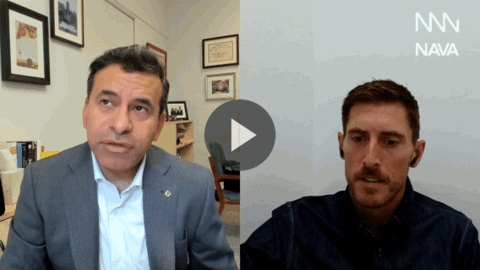September COVID Update for Business Leaders: Dr. Marty Makary Talks Mu Variant & Mandates

As employers continue to navigate the COVID-19 pandemic, Nava Benefits’ Chief Medical Advisor and health policy expert Dr. Marty Makary weighs in on the state of the pandemic and its impacts on the workplace as of September 2021 — from the emerging Mu variant, to vaccine boosters, to the protection provided by natural immunity.
Looking for more up-to-date guidance on navigating COVID-19 in the workplace? Check out our blog for expert insights from Dr. Makary and others.
Since our last update with Covid expert Dr. Marty Makary in early August, there have been a number of developments on the state of the pandemic in the United States. As of this week, an estimated 1 in every 500 U.S. residents have died from the virus. The percentage of fully-vaccinated Americans has also increased to ~53%.

As we continue our monthly Covid updates, Nava's Chief Medical Advisor Dr. Makary offers his expert perspective on the current state of the pandemic, emerging variants, and the vaccine mandate. Read on for the five key takeaways, and watch the full video for more insights.
1. The vaccine continues to be effective against all Covid variants, including Delta and Mu.
To put it in perspective, Delta and Mu are only two out of ~2,000 Covid variants being monitored — and the current vaccine line-up offers protection against all of them, despite the prevalence of mild breakthrough cases. "None of them have evaded the life-protecting effect of immunity," Dr. Makary emphasized.
The recent FDA approval for the Pfizer vaccine only further proves what we already knew: the vaccine is safe, effective, and essential to containing the spread of this virus.
2. Some vulnerable populations will benefit from a booster — but that doesn't negate the vaccine's effectiveness.
The mRNA vaccines offer two layers of protection: antibodies, which protect against mild infection; and B and T cells, which prevent severe illness and death. Scientists and doctors like Dr. Makary have long understood that there was a likelihood of waning antibodies over time following vaccine administration.
But that doesn't mean that the vaccine doesn't provide effective levels of protection; it just means that some people may be more likely to experience a breakthrough infection after these antibodies begin to wear off. This is why boosters have been approved for those who may experience more serious complications from a mild infection, including the immunocompromised or people age 65+.
"[The vaccine has] not failed if you've got a mild infection. That's always been the goal of immunity: to downgrade severe illness to something mild or asymptomatic. By the way, if you get a breakthrough infection, now you have natural immunity added to vaccinated immunity, which is longterm."
3. Employers may want to consider tracking immunity in addition to vaccination status.
Research suggests that natural immunity provides comparable protection to vaccination (or maybe even stronger). Given that, Dr. Makary suggests that employers who are tracking or mandating vaccination consider expanding to also track immunity gained through prior infection.
"We really don't see people get re-infected after an initial infection and get severely ill," Dr. Makary explained. But this doesn't mean that non-immune folks should wait to contract the virus — vaccination is still the safer option by far.
He also suggested that employers recognize the partial immunity that comes with one dose of the two-dose mRNA vaccine. "One thing that my grandfather taught me, who was a pharmacist — when some people can't swallow a pill... he would cut the pill in half. If you can get more compliance with partial immunity... that partial immunity is actually pretty reasonable."
What this means for you: If you choose to track immunity, encourage employees to disclose this information with proof of a positive Covid test or antibody test.
4. The rate of transmission in the South is expected to slow in the coming months, but the North may see spikes this winter.
We're currently seeing a serious surge in Delta variant cases in the South and Southeast. However, as Dr. Makary previously noted in our last conversation, he expects that these cases will crest and begin declining sometime in the near future, as more non-immune people catch the virus and develop antibodies.
Be prepared for Northern states to see a surge of cases as we move into winter and flu season. Still, higher vaccination rates among these states may prevent an outbreak as severe as what we're seeing in the South.
What this means for you: Businesses operating in the northern states may want to prepare for an uptick in cases this winter. Consider offering expanded sick time, on-site vaccinations or testing, or implementing additional precautions.
5. The vaccine mandate for employers with 100+ employees may take two months or longer to go into effect.
The virus' continued progression has caused concerns for employers across the nation. To help prevent transmission in the workplace, President Biden has announced a national mandate requiring all employers with 100+ employees to ensure their workers are either fully vaccinated or tested weekly. However, few details have been provided about this new policy.
"The vaccine mandates, regardless of what we may think about them, did come with good intentions," Dr. Makary emphasized. Still, this announcement caused mixed reactions from workers across industries — and many HR leaders are unsure on how to proceed.
The good news? You have some time before you need to figure it out. Dr. Makary expects that it will take at least two months for a policy to become be enacted and in force. He also predicts that that by the time this policy goes into effect, most of the nation will have turned a corner on Delta transmission rates.
What this means for you: Don't rush into making big changes to your employer's policies or procedures until the mandate details and timeline are official. Instead use this moment to evaluate how the mandate will impact your current employee base, what the path forward may look like, and how you can begin laying the groundwork to make this transition easier. For instance, this may be a good time to begin encouraging employees to report their vaccination status.
Remember that this mandate represents new territory for all employers across the nation, so lean on your broker for real time updates and guidance on next steps. Don't be afraid to ask them questions. And as always, keep an eye out for more Covid updates from Dr. Makary and the Nava team.
Watch the full interview with Dr. Marty Makary here:
Looking for more guidance? As your source for reliable, science-backed info, Nava will continue to provide regular Covid updates with all HR leaders need to know:
- The current state of the pandemic, according to Covid expert Dr. Makary and other members of our Nava Benefits Advisory Board
- Best practices for adapting and adhering to new vaccine mandates in the workplace
- Tips for communicating with employees through the pandemic and beyond
Register now to receive more updates from our team of industry experts:





.webp)
